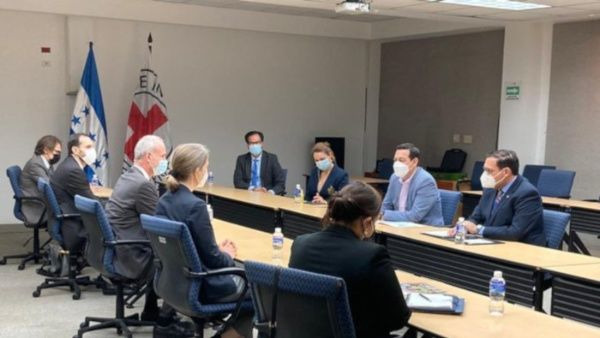
Gilles Carbonnier visited Honduras from April 14-16 to reinforce the humanitarian agenda. | Photo: Twitter @lisandrorosales
Tegucigalpa, April 18 (RHC)-- The Vice President of the International Committee of the Red Cross (ICRC), Gilles Carbonnier, warned that violence in Honduras and El Salvador restricts the possibilities of personal and social development and community participation in these Central American nations.
After six days of visiting both countries, Carbonnier emphasized that the permanent state of violence in these nations generates serious and worrisome consequences related to internal displacement, homicides, limitations to access health services, among others.
In a document in which he expresses his conclusions, the vice-president of the ICRC indicated that there is "concern" about the situation of migrant children in Honduras, Guatemala and Mexico, although he highlighted the "significant reduction of almost 85% in the return of Salvadorans in 2020.
"Effective and coordinated responses are required that involve families and those responsible, and that offer dignified and safe alternatives for the full development of children," he emphasized.
The vice-president of the humanitarian organization and the director of operations for the Americas, Sophie Orr, were in El Salvador from April 10 to 13 to strengthen collaboration with this country in the promotion of humanitarian agendas.
Subsequently, Gilles Carbonnier visited Honduras from April 14-16 to reinforce the humanitarian agenda and to call for the promotion, together with the corresponding authorities, of the draft bills on Internal Displacement by Violence and Regulation of the Use of Force.
The vice president of the Red Cross expressed his concern about an exacerbation of humanitarian needs in Central America due to the impacts generated by COVID-19 and hurricanes Iota and Eta, which made communities already affected by violence much more vulnerable.
"The great hope for tackling the pandemic is undoubtedly vaccination. It is critical that vaccines are distributed equitably and do not create new inequalities. This means that within the vulnerable groups, governments must contemplate and reaffirm the inclusion of internally displaced persons, migrants and people deprived of their freedom," he emphasized.

